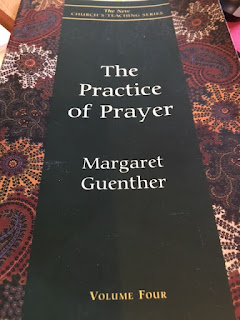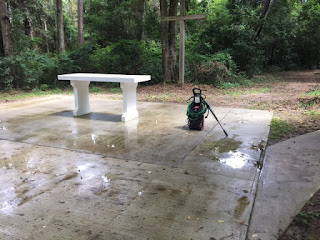Tis the season for short tempers, at least for me.
I had a blow up with some members of the parish over our pumpkin patch.
I have been fighting with PayPal to get us approved to accept credit cards at our pumpkin patch.
I hurt my back moving a pumpkin at the pumpkin patch...right when I needed to drive several hours to the Georgia coast for a workshop.
Funny enough, the focus of the workshop was How to Deal with Conflict.
Perfect. And fitting for the theme of my sermon this week.
Text: Luke 18:9-14
+++
I don’t typically give my sermons a title. But if I were to slap
one on this week’s message it would be, “Praying Part 2: Like This Not That.”
There’s a lot happening in this parable… a lot that might make us
feel as if we’re being placed under the microscope and examined.
Do I pray like this Pharisee?
Am I like that Tax Collector?
Is my interior monologue spilling out of my mouth so that everybody
can hear it?
Luke…besides being the champion of the underdog…is also the Gospel
of stark contrasts in the parables. He loves to have characters that make us
applaud them for being themselves…their true world-weary broken selves… while
we jeer and snicker at the puffed-up and tone-deaf of the other character.
And then we look in the mirror and think, “Oh. Wait. Who am I in
this story?”
I think if we are really honest with ourselves… and our dear
fragile self called “the Ego”…we’re a mix of both Pharisee and Tax Collector.
We’ve all likely held some judgmental thoughts about others.
We’ve all likely been to that place where all we can do is fall on
our knees and say, “Help me, Jesus.”
So, since we can see that we are a little bit of both of them,
let’s take a moment to see who are these two characters?
The Pharisee is a devout Jew. We know that because he’s in the
Temple. He’s telling us how he is doing all the things that the Pharisees do.
They’re the sect of Judaism that knows the laws and the commandments and they
are careful to keep them. His prayer is sincere.
Not stated in the Gospel is the stress this man is under.
As a Jew in the Roman Empire…he’s living under an occupying force…one
which has no real regard for him, his family, his concerns and thinks his
religion is suspect.
The Empire will tolerate the Jews as long as they don’t get too
uppity.
The tax collector is also a Jew.
He must have some devotion since he has come to Temple this morning
to pray.
But as a tax collector…he’s not a “good Jew.”
He is a collaborator with the oppressive Roman Empire. He exploits
his fellow Jews…charging them the tax for the Emperor and a little more to skim
off the top for himself.
Something has motivated him to come to beg for God’s mercy. And his
prayer is sincere because…well… he is a sinner aiding and abetting the misery
of the Pharisee.
He seeks mercy, but we don’t know whether he then repents and stops
working for the Empire.
We also see that there is a physical distance between these two
characters.
The Pharisee is standing alone as he offers his prayer in which he’s
telling God all the good things he has done unlike that no good so-and-so over
there.
The tax collector is also standing far off as he turns to
God…seeking mercy for his sins…and concerned for his own guilt-ridden soul.
Both of these men are separated.
Pulled away from each other.
A break down in community and relationship.
While they’re both Jews…standing and praying in the Temple…they’ve
become enemies of each other.
The external secular force in their lives…the occupying Roman
Empire… has successfully fractured them. And while both men are lifting up
their voices to God in prayer… only one of them has figured out that God is the
source for their redemption because only one of them is understanding…what we
might say today…”He ain’t right.”
The Pharisee doesn’t understand…doesn’t see the plank in his own
eye… that by casting himself as better than all “those people” and especially “that
dude over there… that Roman collaborator”…he has played into one of the
strategies of the Empire: keep the occupied pre-occupied with
infighting…anger and distrust… and they’ll never have the ability to challenge
their oppressor.
The Pharisee is not a collaborator in what he does in his
life, but the Empire has successfully made him a collaborator in how his
resentments have infected his heart and mind…and spoiled his prayers.
These two men standing in their respective corners of the Temple…with
more in common probably than not… represent a divided nation.
An interesting image for us to contemplate in our current times
where we’re either red or blue, black or white, native or immigrant.
We continue to stand apart… in our respective corners…even though
we’re living together on this one planet that we’re supposed to be caring for.
I caught a portion of an interview this past week with William
Shatner about his experience of being one of the chosen to go up into space on the
Blue Origin space craft.
Make all the jokes you want about Captain Kirk going where no one
has gone before… this interview wasn’t the fluff one might have expected.
What Shatner said of his experience was how he was overcome with
grief when he saw our planet. He
described Earth as appearing so fragile… dangling by a thin almost spider
web-like thread… and he could see that it’s in crisis.
He was overcome with a wave of great sadness. And when he stepped
out of the space craft he began to cry.
The interviewer didn’t quite seem to know how to handle this
emotional response from the 91-year-old actor. But what I heard in his words
was that he’d been allowed to share in a grief that’s a cosmic sadness… God’s
mourning… for a creation that is slowly fading away and dying.
We’ve been so pre-occupied with occupying ourselves with wars over
land, waters, and culture that we have forgotten how much we depend on one
another and have a responsibility to protect and care for what we’ve been
gifted: food, water, clean air. I sometimes wonder if the anger that seems to
be everywhere in the world these days is really an emotion masking our sense of
fear and anxiety about the planet.
Maybe…like this Pharisee and tax collector… we’ve become so alienated
from each other to the point that we don’t see the importance of us getting
past our disagreements to focus on a much more important looming crisis. We may
not all be able to travel up into space like Shatner… and take in the planet
from that vantage point.
But we can spend an evening looking at the stars… or taking in the
beauty of a South Georgia sunset.
We breathe in the air… and
on our exhale might we also pray, “God be merciful to me a sinner”… as we
acknowledge the way our separation from each other is keeping us apart from one
another… apart from God… and the precious creation…this fragile earth our
island home.
In the name of God…F/S/HS.



